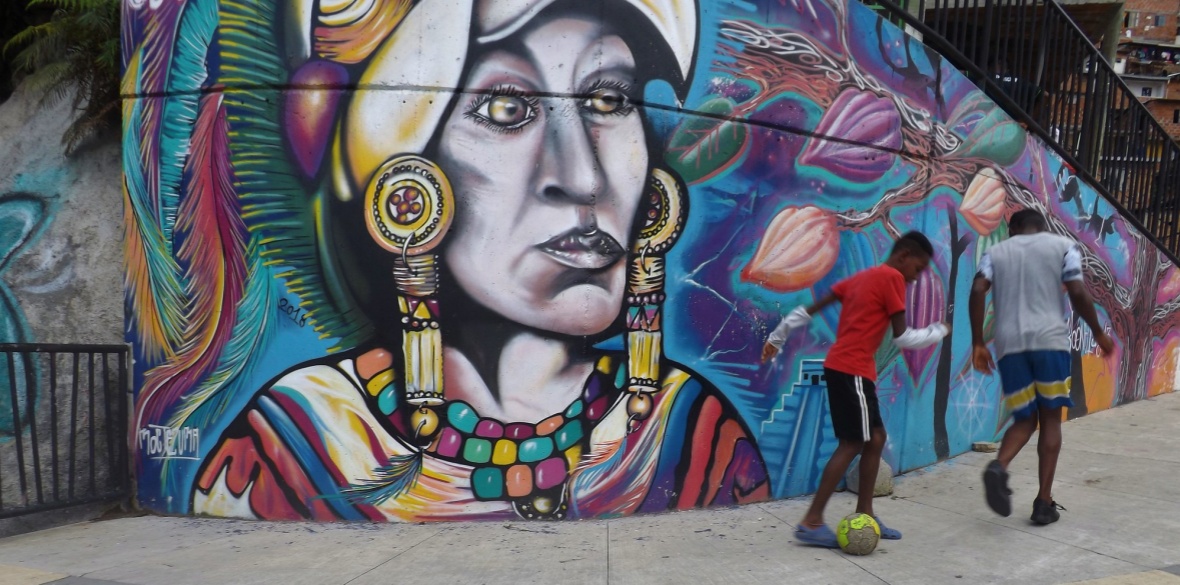This is the last article you can read this month
You can read more article this month
You can read more articles this month
Sorry your limit is up for this month
Reset on:
Please help support the Morning Star by subscribing here
INDIGENOUS communities in Colombia face escalating levels of violence, with 97 leaders and activists murdered in the past year.
Three indigenous guard members were killed and at least seven were injured on Saturday August 10 after their group was attacked as it left a market fair in Toribio in the department of Cauca, south-west Colombia.
At least four attackers opened fire on vehicles in which indigenous community members were travelling.
The dead men were named as Eugenio Tenorio, who was 46 years old, Julio Taquinas Pilue, 50, and Kedvin Mestizo Coicue, 23, who all live in the San Francisco indigenous reserve.
Some of the injured were named as Leonel Coicue, Sandra Milena Pacue, Edinson Eduardo Rivera and Julio Taquinas Pilcue.
In total, four men and three women were injured, with two of the victims under the age of 18.
In a statement released following the triple killing, the National Indigenous Organisation of Colombia (ONIC), the country’s main indigenous body, said that 97 indigenous leaders and activists had been murdered in the past year and 159 since the signing of the peace agreement in November 2016.
The ONIC declared a Situation of Humanitarian, Social and Economic Emergency for all Indigenous Peoples in Colombia.
So far this year, 36 indigenous Nasa people have been killed in the north Cauca region alone, it said.
Several other attacks were committed against indigenous community leaders in the days prior to the August 10 attack.
The previous day, shots were fired at a vehicle transporting senior indigenous guard members to a meeting but did not cause any injuries or deaths.
On August 1, 25-year-old indigenous guard Gersain Yatacue Escue was murdered in Toribio, while 70-year-old traditional doctor and spiritual authority Enrique Guegia was killed in the same zone.
Indigenous communities and organisations recently denounced a systematic campaign by paramilitary and other armed groups to eliminate community leaders and guards.
The indigenous guard, whose members are responsible for community security but are unarmed apart from the traditional wooden staffs they all carry, has resisted attempts by armed groups to appropriate territory and conduct illicit activity.
The ONIC attributed the violence to armed groups including a faction of the Sinaloa Cartel, which it said was behind the August 10 attack, and paramilitary groups such as the Black Eagles, historically linked to state security forces.
In its statement, the ONIC said that it “demands all state institutions and the public ministry guarantee the physical and cultural survival of the indigenous peoples of north Cauca, co-ordinate protection and prevention measures to give an effective response to this situation and to constantly monitor incidents which have occurred in the last month.”
It also called on Colombian authorities and human rights organisations, as well as international bodies such as the United Nations, the Organisation of American States and foreign embassies, “to continue to accompany this serious humanitarian situation, and to carry out the relevant actions in order to safeguard the lives of our indigenous brothers and sisters in Cauca and all Colombia.”
Although President Ivan Duque publicly condemned the August 10 attack, senior figures in the ruling right-wing Democratic Centre (CD) party have stigmatised indigenous movements in southern Colombia.
In April, as massive indigenous-led strikes in Cauca shut down much of southern Colombia and were rooted in chronic underdevelopment and the ongoing instability in rural zones, former president Alvaro Uribe tweeted that “if authority, serene, firm and with social criteria implicates a massacre, it is because there is violence and terror rather than protest on the other side.”
Uribe’s CD colleague, Senator Maria Fernanda Cabal claimed the protests were being co-ordinated by the National Liberation Army (ELN) guerilla movement, which the state classifies as a terrorist organisation.
Human rights groups and opposition politicians condemned Uribe for appearing to condone state violence against protesting communities.
Uribe’s 2002-2010 presidential administrations saw massive human rights violations committed by the state, as governing politicians routinely smeared human rights activists, trade unionists and indigenous leaders as “terrorists” and “narcos.”
Political violence has continued to impact many regions of Colombia despite the signing of the 2016 peace agreement.
More than 500 social activists have been murdered in that time, with indigenous leaders among the most targeted victims.
Long-running tensions persist between the state and Colombia’s indigenous population over historic state abandonment and repression of communities.
This has been compounded by the failure to adequately implement agreements around autonomy and environmental protections for indigenous territories.
Nick MacWilliam is trade union and programmes officer at Justice for Colombia, which works with the British and Irish trade union movements and parliaments in support of human rights and peace in Colombia.











